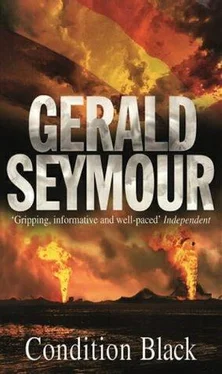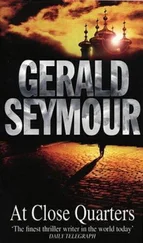Gerald Seymour - Condition black
Здесь есть возможность читать онлайн «Gerald Seymour - Condition black» весь текст электронной книги совершенно бесплатно (целиком полную версию без сокращений). В некоторых случаях можно слушать аудио, скачать через торрент в формате fb2 и присутствует краткое содержание. Жанр: Триллер, на английском языке. Описание произведения, (предисловие) а так же отзывы посетителей доступны на портале библиотеки ЛибКат.
- Название:Condition black
- Автор:
- Жанр:
- Год:неизвестен
- ISBN:нет данных
- Рейтинг книги:5 / 5. Голосов: 1
-
Избранное:Добавить в избранное
- Отзывы:
-
Ваша оценка:
- 100
- 1
- 2
- 3
- 4
- 5
Condition black: краткое содержание, описание и аннотация
Предлагаем к чтению аннотацию, описание, краткое содержание или предисловие (зависит от того, что написал сам автор книги «Condition black»). Если вы не нашли необходимую информацию о книге — напишите в комментариях, мы постараемся отыскать её.
Condition black — читать онлайн бесплатно полную книгу (весь текст) целиком
Ниже представлен текст книги, разбитый по страницам. Система сохранения места последней прочитанной страницы, позволяет с удобством читать онлайн бесплатно книгу «Condition black», без необходимости каждый раз заново искать на чём Вы остановились. Поставьте закладку, и сможете в любой момент перейти на страницу, на которой закончили чтение.
Интервал:
Закладка:
He would take with him only what he could carry in his head.
For his first week there he would sit alone and write out every small item from his memory. Maybe it would take him two or three weeks. When he had cleared his memory, then he would be free to set up his research unit and to plan the administration of his department.
All morning he funnelled his screen across past papers, past calculations, past reports.
And then he had concentrated on what they liked in H area to call the "physics of the extreme". Workings and statistics and figures tumbling up in front of his eyes. The heart core of a warhead detonation, reactions at 100,000,000° Centigrade, press ures of 20,000,000 atmospheres. Work from the lasers, studies from the "Viper" fast-pulse reactor that could produce peak power of 20,000 megawatts. .. So much for him to learn again, so little time before the end of his last day. It was like examination revision, which he had done so well at Leeds. Working quietly, methodically, at speed, he could nevertheless reflect that it would be peculiar to communicate his work to a stranger. It wasn't a question of morality, just that it would be peculiar. But then he had never worked anywhere except at the Establishment, had never had strangers as colleagues, never since he had joined.
He consigned to memory the charts, as much as he could, that dictated beryllium weights, how the tritium material could be melded in minute particles into the molten shape of ochre-coloured plutonium cores, the thickness of the highly enriched uranium that formed the concentric circle around the plutonium inside the quality gold crust.
There was a knock at his door.
He felt the frozen stampede of guilt. He swivelled to face the door.
Carol, hugging a plastic bucket to her waist. "Sorry to disturb you, Dr Bissett. You remember the electrician who had the accident on the A90 site, poor love, there's a collection for him."
He reached into his trouser pocket.
"He's paralysed, Dr Bissett."
He abandoned his trouser pocket. He had four ten pound notes in his wallet, no five pound notes. He took a ten pound note and dropped it into the bucket, amongst the pound coins and the 50 pence pieces. " O h, that's lovely, Dr Bissett, that's really nice of you. So sorry to have disturbed you. Thanks ever so much." He saw the way that Carol eyed him, like he'd cracked her image of him. It would be all round H3 that Dr Bissett had put ten pounds in her bucket.
He came out of the lavatory, in the early afternoon, not looking where he was going, struggling to retain the figures, graph shapes, calculation analyses, swimming in his mind, and walked straight into Basil.
They grabbed at each other. Bissett's hands had hold of the weathered old sinew of Basil's arms below the short sleeves of his shirt. Typical of Basil, late November and dressed as he would have been in June. They made their apologies. Bissett wanted to be away, but Basil would have none of it.
" Y o u r paper, very good. Reuben showed it me. I thought it was first class."
Bissett blushed. " T h a n k s. "
" A n d you may as well know that I have written to the Security Officer to tell him that, in my opinion, you were treated outrage-ously over that business with the files. I have asked that my letter, my assessment of you, should go on your file."
His voice was a whisper. "That's kind of you, Basil. Thank you very much."
"Absolutely nothing, Frederick."
He broke away. He went back to his office. He closed the door behind him. The stranger in the brotherhood. He bent once more to the last hours at his screen. Just a normal day, his last.
The Swede saw the flag fluttering high above the rich foliage of the trees, and at the same instant he heard the shriek of the siren.
There was a wide road for him to cross to get to the gates. There was a car thrashing forward through the traffic towards him.
There were guards in front of the gates, local militia.
He would not have thought that he could run further, faster.
He thought the siren was to warn the guards.
The Swede stumbled out into the road. The traffic parted for him. He had in his sights only the gate, and piercing his ears was the rant of the closing siren. Lead legs, empty lungs, darting crazily through the buses and vans and cars. And then he jerked to his left to avoid a cyclist and the cyclist hit him and he fell.
Because he fell, crashing knees and hands and chest onto the road, the Peugeot with the siren missed him. From the road, from the hot tarmacadam, he had looked up, the split moment, and he had seen the face of the driver career past him before the car skidded into the cyclist
He heard a scream and the brake squeal. He pushed himself up. He ran again.
He staggered off the road, across the wide footpath.
There was the shouting behind him. He saw the gaping curiosity, the bewilderment, on the faces of the militiamen at the gate. One militiaman tried hall heartedly to block him Willi his rifle barrel.
He ran on. He ran through the gate. Behind him now the siren and the shouting. He ran up the driveway. He ran through the wide doorway that was the entrance to the principal building of the British Embassy.
He no longer heard the shunting, he no longer heard the siren.
He lay on the floor in front of the reception desk, and a voice said, "Good afternoon, Sir, how can I be of help to you?"
He Jerked up from his bed Rutherford was in the doorway, and he carried his handset telephone, and it looked to Erlich as if Rutherford's world had fallen in.
Rutherford said, " They pulled us out."
"I don't have to ask why
"His father's raised Curzon Street and burned senior ears."
Erlich said bitterly, "Your people have one hell of an idea of consistent thinking."
"I can't argue with that."
"Are they reared on milk and rice?' Haven't they balls when the going's tough?"
"My orders are crystal clear. Get back to my desk and bring you with me. It's probably not worth saying I'm sorry."
He might as well have gone to Mombasa. He didn't think that he would see Jo again, and it had been for nothing. his virtuous stuff about duty. What did she think? That he could drop everything and head for the African sunshine? He might as well leave tonight before they threw the book at him. Probably Ruane had a transcript of Major Tuck's observations on his desk even now, with an acid memo from Mr Barker about the great astonishment of Her Majesty's Government that Mr Erlich should be armed with a Smith and Wesson rather than the regulation-issue kitchen knife.
"We should have checked the car."
"We should have stayed in the office and moved paper round, what every other bastard does."
Erlich said, "If he'd been there, I'd have shot him."
"Can you be ready to leave in ten minutes?"
"I'll be ready."
They came in turn to see the Swede in a small room in the heart of the Embassy building. There were no windows and the walls were reinforced, sound-proofed. He had drunk five glasses of fresh orange juice.
The first to see him had been the Information Attache, who swept up all loose strands of the Embassy's work, and he had gone away to deliver his report. There was a military policeman outside the door. The military policeman, on the Diplomatic List, was the Ambassador's driver, and he carried a Browning automatic pistol in a shoulder holster under his blazer jacket.
After the Information Attache, the Swede was interviewed briefly by t he Assistant Military Attache, and then again left alone. From the Ambassador's first floor windows, the deployment of militia and plainclothes men from the Department of Public Security was clearly visible.
Next in line was the Charge, the Ambassador's deputy. The Swede was not to know that while he sat with the Charge a telephone call had been received from the Foreign Ministry demanding the immediate expulsion from the protection of diplomatic premises of a dangerous foreign criminal. The Charge left him, and the Military Policeman give him some English newspapers and offered him the choice of tea or coffee. There was some difficulty with the supply of the fresh oranges. The Swede gratefully accepted tea. Sometimes he heard muffled talk in the corridor outside, but it was too distorted for him to understand.
Читать дальшеИнтервал:
Закладка:
Похожие книги на «Condition black»
Представляем Вашему вниманию похожие книги на «Condition black» списком для выбора. Мы отобрали схожую по названию и смыслу литературу в надежде предоставить читателям больше вариантов отыскать новые, интересные, ещё непрочитанные произведения.
Обсуждение, отзывы о книге «Condition black» и просто собственные мнения читателей. Оставьте ваши комментарии, напишите, что Вы думаете о произведении, его смысле или главных героях. Укажите что конкретно понравилось, а что нет, и почему Вы так считаете.












